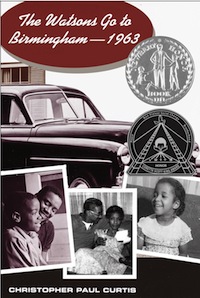The Watsons Go to Birmingham- 1963 by Christopher Paul Curtis
The Watsons Go to
Birmingham- 1963 by Christopher Paul Curtis
The Watsons Go to Birmingham- 1963 is
the story of a black family in 1963 narrated by Kenny, the youngest son and
second child. His mom, father, brother and sister all live in Flint, Michigan.
He takes the bus to school every day, plays with dinosaurs with his friends and
gets teased by his ill-behaved brother. They joke. They tease. They laugh
together. This is life in Flint, Michigan for a black family through the eyes
of a ten year old. A trip to Birmingham to visit their Grandmother throws the
family into an event that young Kenny struggles to understand.
It’s
hard to find children’s books with young black narrators. I am glad I was able
to read this one because it is extreme simply and yet very powerful. The
struggles of the parents and of what was happening around the children was very
subtle. It was almost too subtle but it was there until the very end. One of
the things that I loved about this novel was that it was so normal. Kenny deals
with issues that many children today deal with: an annoying little sister, a
troublesome older brother, and anxiety about school. Yet there is a torrent of
racially motivated actions happening all around him that he is mostly oblivious
too. Kenny is an amusing, well developed character. He is a believable child
and that believability makes this story more enjoyable.
Curtis
created a simple to read, easy to understand, children’s novel about life in
1963. The ending, which I won’t spoil, brings home a powerful message about
life, racism and family. I really enjoyed this book. It was very entertaining,
moved well and had a lot of depth. There was so many layers to this story
hidden behind the humor. I give this 4 out of 5 stars.




Comments
Post a Comment